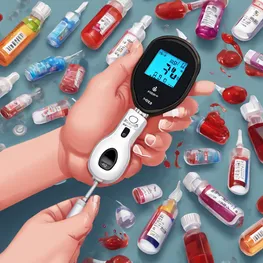Table of contents
- Demystifying Blood Sugar Levels
- Revamp Your Lifestyle for Better Blood Sugar Control
- Achieve Optimal Blood Sugar Control with these Healthy Diet Plans
- Mastering Blood Sugar Control: Expert Tips and Strategies
- Delightful and Nourishing Recipes for Managing Blood Sugar
- Achieving Balance: Regulating Your Blood Sugar for a Healthier You
Regular blood sugar monitoring is an essential practice for individuals with diabetes or prediabetes. It plays a crucial role in managing their condition, preventing complications, and maintaining overall health. By regularly monitoring blood sugar levels, individuals can make informed decisions about their diet, medication, and lifestyle choices. This article explores the significance of regular blood sugar monitoring and the benefits it brings to those living with diabetes or prediabetes.
Demystifying Blood Sugar Levels
Maintaining normal blood sugar levels is crucial for overall health. Understanding what constitutes normal blood sugar levels and the potential risks of having high or low blood sugar can help demystify this important aspect of our well-being. Here are some key points to consider:
- Normal blood sugar levels typically range between 70 and 140 milligrams per deciliter (mg/dL) of blood.
- Having consistently high blood sugar levels, known as hyperglycemia, is a common symptom of diabetes and can lead to serious health complications if left untreated.
- Symptoms of high blood sugar levels may include increased thirst, frequent urination, unexplained weight loss, fatigue, and blurred vision.
- On the other hand, having consistently low blood sugar levels, known as hypoglycemia, can also be dangerous and may result in symptoms like shakiness, confusion, irritability, and even loss of consciousness.
- Maintaining a balanced and healthy diet, regular exercise, and taking prescribed medications if necessary, are key to managing blood sugar levels.
- Regular monitoring of blood sugar levels and consulting with healthcare professionals are important for preventing and managing any potential risks related to blood sugar fluctuations.
Revamp Your Lifestyle for Better Blood Sugar Control
To regulate blood sugar levels effectively, incorporating regular exercise into your lifestyle is essential. Engaging in physical activity helps improve insulin sensitivity, allowing glucose to be utilized for energy. Stress management is also crucial, as stress can raise blood sugar levels. Techniques such as meditation, deep breathing exercises, and yoga can help reduce stress. Additionally, maintaining a healthy diet, getting enough sleep, and staying hydrated can further support blood sugar control. By making these lifestyle changes, individuals can significantly improve their blood sugar regulation and overall well-being.
Achieve Optimal Blood Sugar Control with these Healthy Diet Plans
Managing blood sugar levels is crucial for optimal health. One key dietary recommendation is portion control, as consuming too much food can cause blood sugar spikes. Balanced meals that include a mix of protein, whole grains, and healthy fats can help stabilize blood sugar levels. By avoiding processed sugars, individuals can prevent rapid blood sugar fluctuations. Instead, opting for natural sweeteners and focusing on low-glycemic foods can provide a steady release of glucose, promoting blood sugar control and overall well-being.
Mastering Blood Sugar Control: Expert Tips and Strategies
Mastering Blood Sugar Control: Expert Tips and Strategies is a valuable resource for understanding how to effectively manage blood sugar levels. Experts provide practical tips that emphasize the significance of taking regular medication or insulin, staying properly hydrated, and maintaining consistent sleep patterns. Learning from these experts can make a significant impact on controlling blood sugar levels and improving overall health. With their guidance, individuals will gain the knowledge and tools necessary to successfully manage their blood sugar levels and lead a healthier, more balanced lifestyle.
Delightful and Nourishing Recipes for Managing Blood Sugar
Delightful and Nourishing Recipes for Managing Blood Sugar. Explore a curated collection of healthy and delicious recipes designed specifically for individuals seeking to manage their blood sugar levels. Our recipes are crafted with nutrient-dense ingredients and carefully balanced to provide the right combination of carbohydrates, proteins, and fats. From colorful salads to satisfying main dishes and guilt-free desserts, you'll find a variety of options that promote stable blood sugar levels. Whether you have diabetes or simply want to adopt a healthier lifestyle, our recipes offer flavorsome meals that won't compromise on taste or nutrition.
Achieving Balance: Regulating Your Blood Sugar for a Healthier You
Maintaining regular blood sugar monitoring and adopting healthy lifestyle changes and diets are crucial for effectively managing blood sugar levels. By vigilantly monitoring blood sugar levels and making necessary adjustments, individuals can prevent complications associated with high or low blood sugar. Implementing healthy eating habits and engaging in regular physical activity helps to stabilize blood sugar levels, improve insulin sensitivity, and manage weight. Moreover, a healthy lifestyle reduces the risk of developing type 2 diabetes and its associated complications, such as heart disease and kidney problems. By consistently monitoring blood sugar levels and embracing a balanced lifestyle, individuals can avoid spikes and crashes in blood sugar levels, promoting overall health and well-being. Additionally, regular monitoring enables individuals to identify patterns and make informed decisions about their medication, diet, and exercise routines. Overall, regular blood sugar monitoring, combined with healthy lifestyle changes and diets, is a proactive approach to effectively managing blood sugar levels and maintaining optimal health.
- Prevents complications associated with high or low blood sugar
- Stabilizes blood sugar levels, improves insulin sensitivity, and manages weight
- Reduces the risk of developing type 2 diabetes and associated complications
- Avoids spikes and crashes in blood sugar levels
- Allows individuals to make informed decisions about medication, diet, and exercise routines
- Promotes overall health and well-being
In conclusion, regular blood sugar monitoring is crucial for managing diabetes and maintaining overall health. It allows individuals to understand their body's response to food, exercise, medication, and stress, helping them make informed decisions about their lifestyle choices. Monitoring blood sugar levels also helps identify potential complications and adjust treatment plans accordingly. By regularly tracking blood sugar, individuals can take proactive steps to prevent serious health issues and ensure their diabetes is well-controlled, leading to a better quality of life.
Frequently asked questions related to why is blood sugar monitoring important
Why is regular blood sugar monitoring important?
Regular blood sugar monitoring is important because it allows individuals with diabetes to keep track of their blood sugar levels and make necessary adjustments to their medication, diet, and lifestyle. It helps prevent complications associated with high or low blood sugar levels and allows for better diabetes management.
What should I do if my blood sugar levels are consistently high or low?
If your blood sugar levels are consistently high or low, it is important to consult with your healthcare provider. They can help determine the underlying causes and recommend appropriate adjustments to your diabetes management plan. This may include changes in medication dosage, modifications in diet and exercise routine, and potential referrals to specialists for further evaluation and support.
What are the benefits of regular blood sugar monitoring?
Regular blood sugar monitoring provides several benefits. It helps identify patterns and trends in blood sugar levels, allowing individuals to adjust their diabetes management plan accordingly. It helps detect hyperglycemia (high blood sugar) and hypoglycemia (low blood sugar) early, which can help prevent emergencies. Regular monitoring also provides valuable information for healthcare providers to assess the effectiveness of medications and make necessary changes to the treatment plan.
Can regular blood sugar monitoring help prevent diabetes-related complications?
Yes, regular blood sugar monitoring plays a crucial role in preventing diabetes-related complications. By maintaining optimal blood sugar levels, individuals can reduce the risk of developing long-term complications such as heart disease, kidney damage, nerve damage, and eye problems. Monitoring blood sugar levels allows for timely intervention and adjustment of medications, diet, and lifestyle to prevent complications.
How often should I monitor my blood sugar levels?
The frequency of blood sugar monitoring depends on the individual's specific needs and recommendations from their healthcare provider. Generally, individuals with type 1 diabetes should monitor their blood sugar levels multiple times a day, including before meals, after meals, and before bedtime. For individuals with type 2 diabetes, the frequency may vary based on their treatment plan, but regular monitoring is still crucial for managing blood sugar levels effectively.







